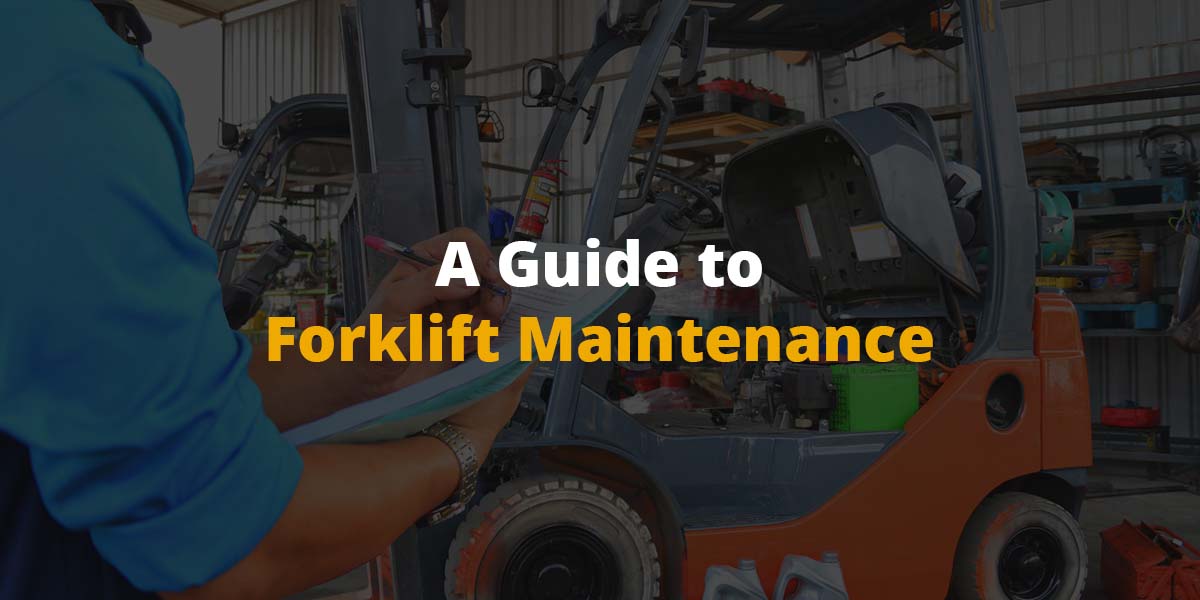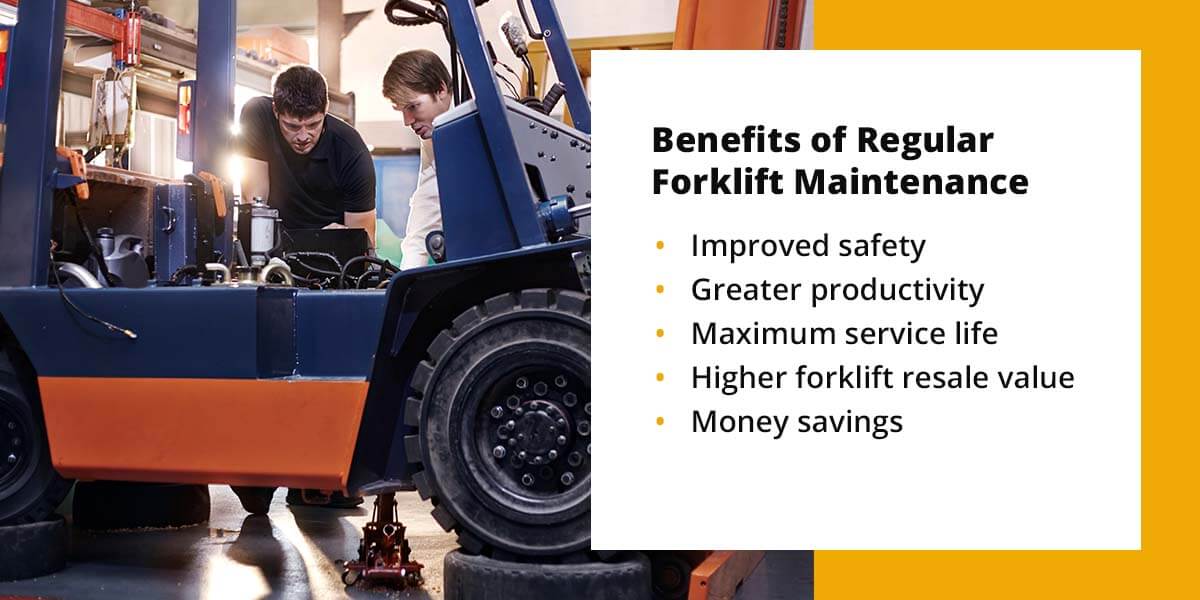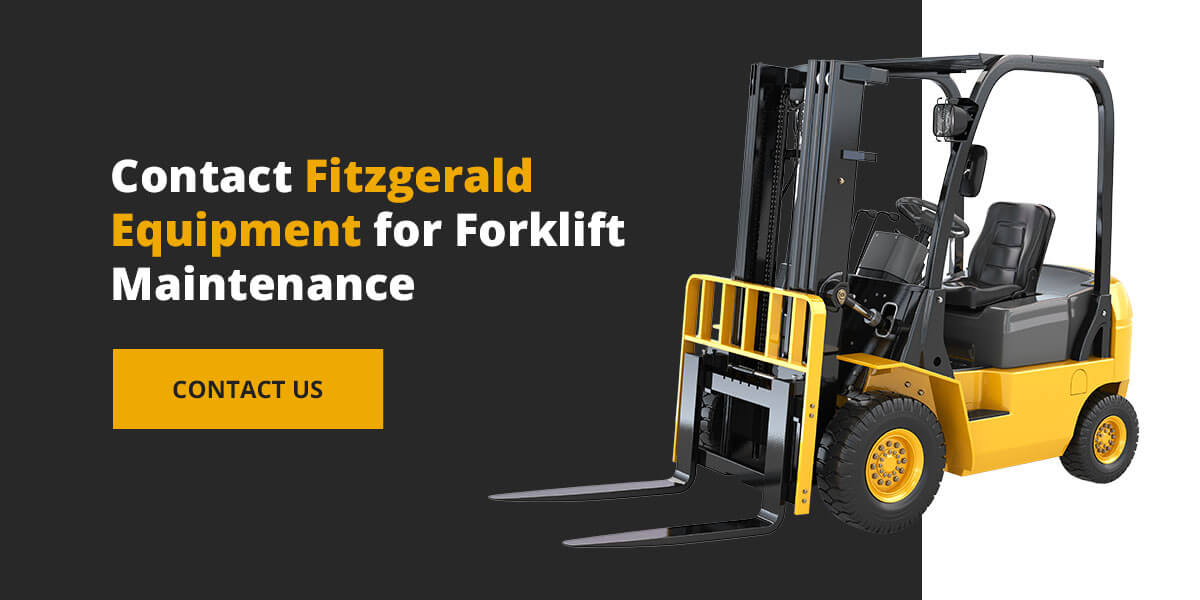
The forklifts in your warehouse see a lot of action. Depending on your usage, they could easily perform over 100 hours of work per month. That time only adds up as the months go by. Over time, your forklifts can experience some serious wear and tear. You'll need a forklift maintenance plan to keep them running safely and properly.
But what is forklift maintenance? Is there a forklift maintenance checklist you should be following? If you're wondering how to maintain your forklifts to achieve the best outcomes, you've come to the right place. This guide includes everything you need to know for forklift maintenance.
What Is Forklift Maintenance?
Forklift maintenance is an umbrella term describing the actions taken to fix forklift issues and prevent problems from occurring. As your warehouse employees use your forklifts, the equipment will slowly start to wear out. Depending on any existing issues present in the forklifts, they can wear out even sooner. Forklift maintenance will help slow down the deterioration of your forklifts and keep them working at their best for as long as possible.
Only professionals should perform forklift maintenance. Trying to repair and maintain your forklifts yourself could lead to unintended consequences, oversights and more trouble in the long run. Your best bet is to let the professionals handle your forklift maintenance needs so you can enjoy better outcomes.
How Often Do Forklifts Need Maintenance?
Forklifts need maintenance at periodic intervals during their working life. These intervals are measured in the number of hours that a forklift has been turned on and operating. After a forklift reaches a certain number of hours, it should go in for maintenance. The more hours that pass, the more extensive the maintenance needs may be.
You want to ensure you regularly maintain your warehouse's forklifts for the best results. This means bringing forklifts in for professional maintenance at smaller hour intervals for routine checkups and at longer hour intervals for more critical maintenance activities. Note that different types of forklifts — like gas-powered and electric ones — will have different needs and maintenance requirements, so it's important to consult with a professional about the best maintenance regimen for your particular forklifts.
Here's a general timeline of how often a gas-powered forklift may need maintenance and what tasks a professional forklift technician might perform at that time:
- Every 250 to 300 hours: A professional should perform a routine inspection of the entire forklift. They should change the filters, check and change the engine fluids, inspect the brakes, relubricate components and replace parts if needed.
- Every 500 to 600 hours: At this time, a professional will do the same routine service listed above, along with some more extensive actions. These can include replacing spark plugs, replacing the antifreeze, checking hydraulic oil levels, cleaning the radiator and adjusting the hand brake.
- Every 1,000 hours: This service should include everything mentioned above, in addition to changing all filters and fluids. The professional forklift technician should also lubricate the drive hubs.
- Every 2,000 hours: This is the most extensive maintenance session of all. Besides including all the above actions, this service visit will consist of a cooling system check, hydraulic pressure check, inspection of brake drums, steer axle inspection, fuel system cleaning and compression check.
Electric forklifts will also need routine maintenance but at less frequent intervals than gas-powered ones. If you have electric forklifts, talk to a professional forklift technician about their specific maintenance needs.
A few factors may cause your forklifts to need more frequent maintenance, including the following:
- Extreme or dirty conditions: Extreme operating conditions or high levels of dust and dirt can put extra wear and tear on your forklifts, causing them to need maintenance more often.
- Seasonal spikes: If your warehouse sees increased activity at certain times throughout the year, you may want to perform the 1,000-hour or 2,000-hour maintenance sessions a little earlier. Since these maintenance sessions take a bit more time to complete, you will want to avoid having to perform them when your warehouse activity is at its highest.
- The use of attachments: Attachments cause a forklift's lift and hydraulic systems to work harder, meaning your forklift may need maintenance sooner than a forklift without attachments.

Benefits of Regular Forklift Maintenance
Regular forklift maintenance is crucial for getting the best results in your warehouse. Here are some of the main benefits you can experience:
- Improved safety: Operating forklifts that have not received regular maintenance is dangerous to your employees. When you maintain your forklifts regularly, they will operate properly to ensure your workers stay as safe as possible on the job.
- Greater productivity: Your warehouse is likely a busy place with deadlines to meet. If a forklift breaks down on the job, you'll lose a lot of productivity. Regular maintenance reduces the risk of a forklift malfunction, so you have a better chance of keeping to your timelines and staying productive every day.
- Maximum service life: Your forklifts cost a lot of money, making them some of your warehouse's most valuable assets. For this reason, you want to get the most out of them. Regular maintenance will help your forklifts reach their longest working life, giving you the best value possible.
- Higher forklift resale value: When the time comes for you to sell a forklift, you want to get the highest sale price for it. You can only achieve this by regularly maintaining your forklift and having verifiable records of maintenance to show the buyer.
- Money savings: Professional forklift maintenance costs money, but you will save money over time by avoiding costly repairs and on-the-job breakdowns.
How Much Does Regular Forklift Maintenance Cost?
It's important to budget properly for regular forklift maintenance, as it will be a recurring cost for your warehouse. Talk to a professional forklift maintenance provider to price out their services. Note that maintenance costs can vary significantly depending on the current condition of your forklifts and if any outside factors are affecting them. The age of your forklift may also contribute to its maintenance costs.

Contact Fitzgerald Equipment for Forklift Maintenance
The professionals at Fitzgerald Equipment are ready to meet your forklift maintenance service needs. We also offer new forklifts and used forklifts for sale. You can also rent forklifts from us for your warehousing needs if needed.
Contact us today if you have any questions or are ready to take the next step!



